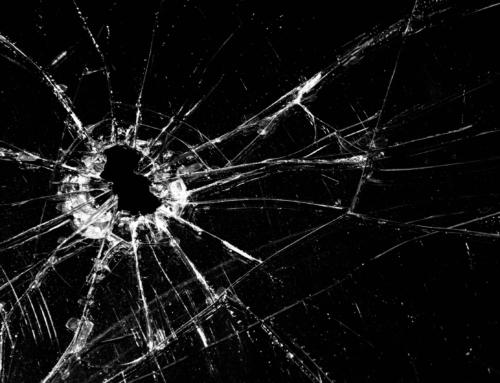In my last post we looked at how self-deception can put us “in a box” and literally keep us from “thinking outside the box.” When we betray ourselves we seek to justify ourselves. We tell ourselves a story in which the wrong we are doing appears right, or at least not our fault. As part of this self-justification, we blame others and excuse ourselves. We shift responsibility for the wrong we are doing on to them. This act of blaming takes the form of a negative emotion or attitude, such as self-pity, fear, anger, resentment, arrogance, or irritation.
Caught up in such an emotion or attitude, we actually believe the story we are telling ourselves— we actually believe we are victims of those we are blaming. We feel unjustly provoked by them— put upon, wronged, taken advantage of, and so forth. (There is a great difference between being a victim and, in an effort to justify ourselves, acting the victim’s part.)
But, how bad could it really be, it’s only a little “blind spot” in one small area of my life?
First, let’s not minimize blind spots – the name is appropriate. One consideration of blind spots involves that portion of the mind that houses hidden biases. Hidden, as in without our awareness or conscious control. These are thoughts that shape our likes and dislikes, judgments about others’ character, abilities, or demonstrated behaviors outside of our awareness!
Said another way, blind spots are areas or subjects about which we are uninformed, prejudiced or unappreciative. Let’s remember these so-called blind spots are self-inflicted and created (in this context) by self-deception.
Secondly, it gets worse.
A bigger box
Over time, as we repeatedly justify ourselves in self-betrayal, we tend to develop a self-justifying self-image. For example, a person might see herself as “a parent who deserves well-behaved children,” “the boss who has all the answers,” “a well-liked co-worker,” “the one who has to take all the responsibility around here,” or even “a worthless person.”
When such a self-justifying self-image becomes habitual with us, it doesn’t take a new self-betrayal to cause us to regard people accusingly. Even before we enter a new situation we are carrying that self-image with us, so that we are all set to find fault with others. We are in what might be called “a bigger box.” We tend to carry this bigger box with us, where ever we go.
Being in the box distorts our sense of right and wrong. For example, it leads us to think that it’s not fair that we should feel obligated to be kind to the person we are blaming. “Yeah, I suppose I should help him, but why should I when he’s acting like such a jerk?”
Collusion
Blame begets blame. When they feel accused, other people blame us in return. In their minds, our bad behavior toward them justifies the way they are treating us. In this way, blaming another person works like a self-fulfilling prophecy. The more two self- betrayers accuse one another, the more they provoke in each other the very behavior they are criticizing. They give each other an excuse for behaving badly. This mutually destructive collaboration is “collusion.”
Thus it is that when we betray ourselves we typically co-create, with our collusion partner, the very behavior that bothers us. When we believe another person is the source of our problem, chances are that this very belief is the real source of the problem. Seeing others as the problem is the problem. Each colluder takes the other’s provocative behavior as proof of his or her own innocence; each needs the other to be in the wrong in order to have evidence of being in the right! In this perverse way, we prize the very behavior we find offensive!
When we collude with another person, we’re sure we are doing the best that can reasonably be expected of us to deal with that person. We are certain that we are not acting maliciously, and the other person feels the same way—even though we look malicious to one another. Each of us feels in the defensive position; each of us is sure the other is acting offensively. Each of us believes the problem would be solved if the other person would change. But the more each tries to change the other, the more the other feels accused and attacked—and the worse the problem gets. Our “solutions” cause the very problem we are trying to solve!
Please notice the role deception, self-deception in particular, continues to play in this process. It affects everyone. I was recently in a meeting with a CEO discussing self-deception. He ended the conversation by saying, “Thankfully, I am totally free of self-deception.” What do you think?
In Other Words…
“People think that a liar gains a victory over his victim. What I’ve learned is that a lie is an act of self-abdication, because one surrenders one’s reality to the person to whom one lies, making that person one’s master, condemning oneself from then on to faking the sort of reality that person’s view requires to be faked…The man who lies to the world, is the world’s slave from then on…There are no white lies, there is only the blackest of destruction, and a white lie is the blackest of all.” ― Ayn Rand, Atlas Shrugged
“When all else fails, complicate matters.” ― Aaron Allston
“The most important thing in communication is hearing what isn’t being said. The art of reading between the lines is a life long quest of the wise.” ― Shannon L. Alder
“Mrs. Hopewell had no bad qualities of her own but she was able to use other people’s in such a constructive way that she never felt the lack.” ― Flannery O’Connor, A Good Man is Hard to Find and Other Stories
In The Word…
The heart is deceitful above all things and beyond cure. Who can understand it? -Jeremiah 17:9






